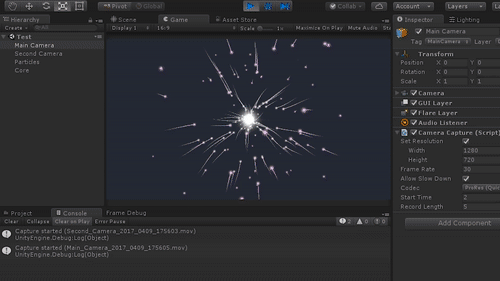FFmpegOut is a Unity plugin that allows the Unity editor and applications to record video using FFmpeg as a video encoder.
First of all, note that Unity Recorder would be a better choice in most cases for the same purpose. It's strongly recommended to check and try it out before installing FFmpegOut.
- Pros: Easy to use. Better UI/UX.
- Pros: Stable and robust. Officially supported by Unity.
- Pros: Supports a wide variety of codecs.
- Cons: Non user friendly UI/UX.
- Cons: Complex legal factors (GPL/LGPL, patent risk)
In short, you should use Unity Recorder unless you need a special codec like ProRes or lossless H.264.
- Unity 2018.3 or later
- Windows: Direct3D 11
- macOS: Metal
- Linux: Vulkan
FFmpegOut only supports desktop platforms.
FFmpegOut works not only on the legacy rendering paths (forward/deferred) but also on the standard scriptable render pipelines (LWRP/HDRP).
Download and import the following packages into your project.
- FFmpegOut package (MIT license)
- FFmpegOutBinaries package (GPL)
The Camera Capture component (CameraCapture) is used to capture frames
rendered by an attached camera.
It has a few properties for recording video: frame dimensions, preset and frame rate.
The dimensions of recorded video are specified with the Width and Height properties. The size of the screen or the game view will be overridden by these values.
At the moment the following presets are available for use.
| Name | Container | Description |
|---|---|---|
| H.264 Default | MP4 | Recommended for general use. |
| H.264 NVIDIA | MP4 | Highly optimized. Requires a NVIDIA GPU |
| H.264 Lossless 420 | MP4 | Recommended for pre-render use. |
| H.264 Lossless 444 | MP4 | High quality but not widely supported. |
| HEVC Default | MP4 | High quality but slow. |
| HEVC NVIDIA | MP4 | Highly optimized. Requires a NVIDIA GPU |
| ProRes 422 | QuickTime | |
| ProRes 4444 | QuickTime | Supports alpha channel. |
| VP8 | WebM | |
| VP9 | WebM | High quality but slow. |
| HAP | QuickTime | |
| HAP Alpha | QuickTime | Supports alpha channel |
| HAP Q | QuickTime |
The Frame Rate property controls the sampling frequency of the capture component. Note that it's independent from the application frame rate. It drops/duplicates frames to fill gaps between the recording frame rate and the application frame rate. To avoid frame dropping, consider using the frame rate controller component (see below).
The Frame Rate Controller component is a small utility to control the application frame rate.
It tries controlling frame rate via Application.targetFrameRate and QualitySettings.vSyncCount. Note that it only works in a best-effort fashion. Although it's expected to provide a better result, it's not guaranteed to work exactly as specified.
When the Offline Mode property is enabled, it explicitly controls the application frame rate via Time.captureFramerate. In this mode, application time is decoupled from wall-clock time so it's guaranteed that no frame dropping happens. This is useful when using the capture component to output pre-render footage.
Note that the FFmpegOutBinaries package is not placed under this license. When distributing an application with the package, it must be taken into account that multiple licenses are involved. See the FFmpeg License page for further details.


